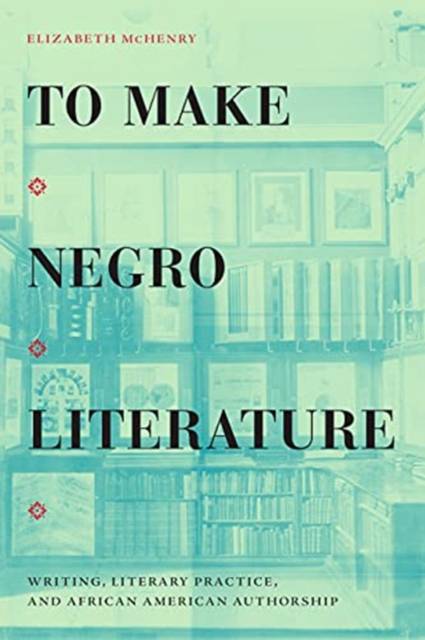
Door een staking bij bpost kan je online bestelling op dit moment iets langer onderweg zijn dan voorzien. Dringend iets nodig? Onze winkels ontvangen jou met open armen!
- Afhalen na 1 uur in een winkel met voorraad
- Gratis thuislevering in België vanaf € 30
- Ruim aanbod met 7 miljoen producten
Door een staking bij bpost kan je online bestelling op dit moment iets langer onderweg zijn dan voorzien. Dringend iets nodig? Onze winkels ontvangen jou met open armen!
- Afhalen na 1 uur in een winkel met voorraad
- Gratis thuislevering in België vanaf € 30
- Ruim aanbod met 7 miljoen producten
Zoeken
To Make Negro Literature
Writing, Literary Practice, and African American Authorship
Elizabeth McHenry
Hardcover | Engels
€ 173,95
+ 347 punten
Uitvoering
Omschrijving
In To Make Negro Literature Elizabeth McHenry traces African American authorship in the decade following the 1896 legalization of segregation. She shifts critical focus from the published texts of acclaimed writers to unfamiliar practitioners whose works reflect the unsettledness of African American letters in this period. Analyzing literary projects that were unpublished, unsuccessful, or only partially achieved, McHenry recovers a hidden genealogy of Black literature as having emerged tentatively, laboriously, and unevenly. She locates this history in books sold by subscription, in lists and bibliographies of African American authors and books assembled at the turn of the century, in the act of ghostwriting, and in manuscripts submitted to publishers for consideration and the letters of introduction that accompanied them. By attending to these sites and prioritizing overlooked archives, McHenry reveals a radically different literary landscape, revising concepts of Black authorship and offering a fresh account of the development of "Negro literature" focused on the never published, the barely read, and the unconventional.
Specificaties
Betrokkenen
- Auteur(s):
- Uitgeverij:
Inhoud
- Aantal bladzijden:
- 312
- Taal:
- Engels
Eigenschappen
- Productcode (EAN):
- 9781478013594
- Verschijningsdatum:
- 22/10/2021
- Uitvoering:
- Hardcover
- Formaat:
- Genaaid
- Afmetingen:
- 152 mm x 229 mm
- Gewicht:
- 585 g

Alleen bij Standaard Boekhandel
+ 347 punten op je klantenkaart van Standaard Boekhandel
Beoordelingen
We publiceren alleen reviews die voldoen aan de voorwaarden voor reviews. Bekijk onze voorwaarden voor reviews.











